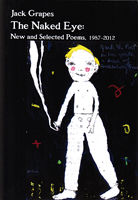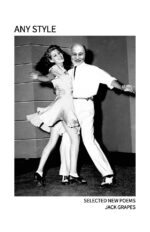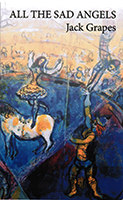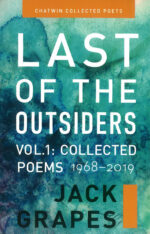Description
Bombshelter Press, 2012, 392 pgs. Includes work from Trees, Coffee and the Eyes of Deer; and the running form, naked, Blake; Breaking Down the Surface of the World, Lucky Finds, and 46 new poems. Afterword by Bill Mohr, “Just Temporarily Alive: The Transmission Poetry of Jack Grapes and the Stand Up School of Los Angeles Poets.
Reviews
The Naked Eye is an incredibly dense, wondrous collection. I am staggered to tears by the writing; some of the best (most sincerely) I’ve read in years. ‘The Man in Charge of Watering,’ ‘Pretend,’ ‘This Life,’ and all the ending poems are striking – not ‘confessional’ – but so personal, in the sense that the reader can immediately leap inside, and then be broad-sided by his vision.
Kate Knapp Johnson, This Perfect Life
There is a supreme and eloquent strength in Grapes’ keeping out of the various “schools” of poetry. His poems are some of the best ever written, not because they reshuffle life so sensibly, so eloquently, or because Grapes is so purely himself and so purely human, but because he has a tender, caring passion that is hot and soft and so frightfully real and so frightfully brings out our dead selfish carcasses to feel more convincingly than ever before the full spectrum of the earth we live on.
Douglas Blazek, Kaleidoscope
The beautiful logic of his poems seems to refute my own half-baked prejudices, change my own thinking. What more could be expected of any poems? I’ll tell you what more. The power or ability to astound. There are poems in this book that turn my head around a complete 360 degrees, that strike my heart’s wooden gong with their clear, cold millimeters of magic.
Tom Kryss, Black Rabbit Press
Jack Grapes’ new book, The Naked Eye, New and Selected Poems, 1987-2012, an anthology of years of his work, past and current, from his previous books. At the age of 70, Grapes appears to be moving on, even as The Naked Eye seems to wrap up a unique body of work in American poetry. Many of his reviewers and critics have found it difficult to grasp the various literary tactics he employs in his work, often pigeon-holing him as either a “confessional” poet, a “stand-up” poet, a “language/experimental” poet, or a more traditional academic poet. Yet, Grapes defies easy categorization, and the vaudeville playfulness of his work can obfuscate his darker themes, while the morbid sensibility of some of his poems can confuse those looking at his surface geniality. “Now-you-see-me, now-you-don’t” would be an apt characterization of his poetic strategy. The masks of tragedy and comedy are not only switched in the middle of a poem, but often the mask of tragedy lies just under the mask of comedy, and vice-versa. A tap-dance about ordering a beer in a Paris cafe can suddenly become a lamentation for the endurance of love and the denial of death. A tongue-in-cheek escapade on hiking in the Sierras can suddenly become a knife-in-the-gut celebration of the fragility of friendship. As Robert Peters wrote in a review of one of Jack’s earlier books, “Grapes writes deceptively, inventing a constant voice, intimate, congenial, a voice you feel you can trust — until he flashes horror, jingling a cloth close to your eyes. ‘I am the darkness within in you all,’ writes Grapes, ‘I will get you.'” Grapes’ astonishing range renders this collection of poetry extraordinarily complex in its ability to embrace domestic sorrow and joy, and yet deliver homage to the traditional literary greats, ranging from the ancient Homer to moderns such as Ezra Pound. As a matter of fact, his influences are so wide-ranging, it’s hard to pin them down to even a select few. He’s a bit of a magpie, building the nest of his poems from the twigs of so many styles and techniques that it’s hard to tell from any one poem whether Grapes is doing a stand-up routine or defining the agonies of the human heart, which is always, as Grapes is fond of quoting Faulkner Nobel Prize speech,”in conflict with itself.” At one point as I was reading through this book, I started weeping, then sobbing, real tears running down my face, something profound happening inside of me. Maybe, just maybe, the key to life is in Jack Grapes’ poetry, the happiness, the overcoming, the power of being alive, the gift of being who one really is, the job of being real, and the courage and the confidence that we all need to cut through the baloney – it is all there in Grapes’ powerful words. The Naked Eye is an absolute must read, an experience, an exaltation of life and literature. Besides, who can really afford to pass up a transcendent poem about taking in the groceries and watering the front lawn from “The Man In Charge of Watering.” In Lucky Finds, Jack writes:
The past is so enormous, gathering shape, coiling its arms and tongue around the death of a careless future. That’s why you run so fast: to make pudding of this poem. To reach back and right the upturned salt shaker. To leave the cold kitchen alone and cheap with its voices. How many times can you make love do the work of a hundred deaths, in vomit, in rages, in rage, in sunlight, in bruise, in bloodsuck, in locked closets, in eye-patch. This is what they do not teach in school. This is what cannot be written.
This may be so, but somehow Jack does it. Both The Naked Eye, and Poems So Far So Far So Good So Far To Go, and All the Sad Angels are available on Amazon. You could do worse then spend a weekend with all three of these books.
Roni Keller for The Cultural Weekly





